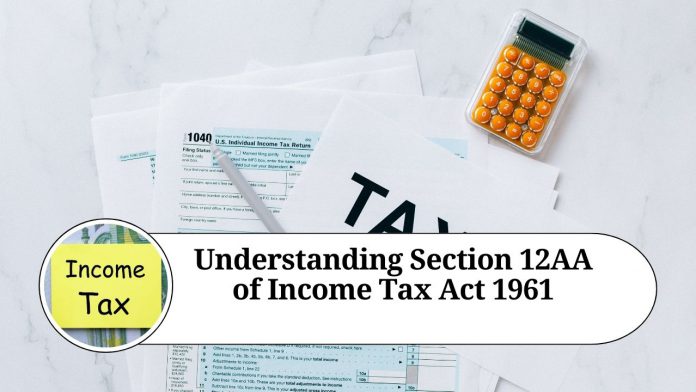Charitable trusts and institutions play a significant role in contributing to the social and economic development of a country. They undertake various activities and initiatives for the welfare of society, such as providing education, healthcare, relief to the poor, and other charitable purposes. To encourage and regulate the functioning of such organizations, the Income Tax Act, 1961, provides for the registration of charitable trusts and institutions under Section 12AA.
What is Section 12AA of Income Tax Act 1961?
Section 12AA of Income Tax Act 1961 deals with the registration of charitable trusts and institutions. As per this section, trusts and institutions engaged in charitable activities can apply for registration to claim tax exemptions and deductions under various provisions of the Income Tax Act.
Registration under Section 12AA is a one-time process that enables the trust or institution to enjoy tax exemptions and deductions for an indefinite period, subject to fulfillment of certain conditions.
Who can apply for registration under Section 12AA?
Trusts and institutions that intend to undertake charitable activities and claim tax exemptions under the Income Tax Act can apply for registration under Section 12AA. However, such organizations must fulfill certain conditions to be eligible for registration, such as:
- The activities of the trust or institution must be for charitable purposes.
- The income of the trust or institution must be applied solely for charitable purposes and not for the benefit of the trustees or members of the organization.
- The trust or institution must maintain proper books of accounts and get them audited annually.
- The trust or institution must not engage in any activity that is prohibited under the law.
How to apply for registration under Section 12AA?
The application for registration under Section 12AA must be made in Form 10A to the Commissioner of Income Tax (Exemptions) of the jurisdiction in which the trust or institution is located. The application must be accompanied by the following documents:
- Copy of the trust deed or memorandum of association and rules and regulations.
- Details of the activities of the trust or institution.
- Copies of the annual accounts, balance sheet, and income and expenditure statement.
- Details of the trustees or members of the organization.
The Commissioner of Income Tax (Exemptions) may call for further information or documents if necessary. If satisfied with the application, the Commissioner shall grant registration to the trust or institution under Section 12AA.
Conclusion:
Section 12AA of the Income Tax Act, 1961, provides a framework for the registration of charitable trusts and institutions. The registration enables these organizations to claim tax exemptions and deductions under various provisions of the Income Tax Act. The registration process requires fulfillment of certain conditions, and the application must be made in the prescribed form to the Commissioner of Income Tax (Exemptions). The registration is a one-time process, and the trust or institution can enjoy tax benefits for an indefinite period, subject to fulfillment of conditions.
Read more useful content:
- section 234e of income tax act
- section 286 of income tax act
- section 90a of income tax act
- section 40a(7) of income tax act
- section 226(3) of income tax act
- section 24 of income tax act
Frequently Asked Questions (FAQs)
Q1. What is Section 12AA of the Income Tax Act, 1961?
A1. Section 12AA of the Income Tax Act, 1961, deals with the registration of charitable trusts and institutions.
Q2. Who can apply for registration under Section 12AA?
A2. Trusts and institutions engaged in charitable activities can apply for registration under Section 12AA. However, such organizations must fulfill certain conditions to be eligible for registration.
Q3. What are the conditions to be fulfilled for registration under Section 12AA?
A3. The conditions to be fulfilled for registration under Section 12AA include:
The activities of the trust or institution must be for charitable purposes.
The income of the trust or institution must be applied solely for charitable purposes and not for the benefit of the trustees or members of the organization.
The trust or institution must maintain proper books of accounts and get them audited annually.
The trust or institution must not engage in any activity that is prohibited under the law.
Q4. What are the benefits of registration under Section 12AA?
A4. Registration under Section 12AA enables trusts and institutions to claim tax exemptions and deductions under various provisions of the Income Tax Act.
Q5. Is registration under Section 12AA a one-time process?
A5. Yes, registration under Section 12AA is a one-time process that enables trusts and institutions to enjoy tax benefits for an indefinite period, subject to fulfillment of conditions.
Q6. What is the procedure for registration under Section 12AA?
A6. The procedure for registration under Section 12AA requires the submission of an application in Form 10A to the Commissioner of Income Tax (Exemptions) of the jurisdiction in which the trust or institution is located. The application must be accompanied by certain documents such as copies of the trust deed, annual accounts, and details of the activities of the trust or institution.
Q7. Can the Commissioner of Income Tax (Exemptions) reject an application for registration under Section 12AA?
A7. Yes, the Commissioner of Income Tax (Exemptions) may reject an application for registration under Section 12AA if the organization does not fulfill the conditions required for registration. However, the organization has the option to appeal against such rejection.




















